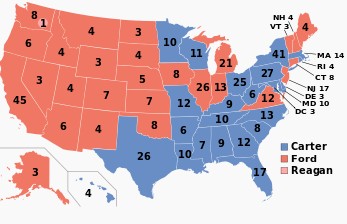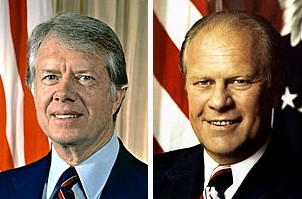
United States presidential election of 1976
Wikipedia | 2013-01-10 10:54
| United States presidential election, 1976 | ||||||||||||||||||||||||||||||||||||||||||||
|
||||||||||||||||||||||||||||||||||||||||||||
|
||||||||||||||||||||||||||||||||||||||||||||

|
||||||||||||||||||||||||||||||||||||||||||||
| Presidential election results map. Blue denotes states won by Carter/Mondale, Red denotes those won by Ford/Dole. Ronald Reagan received an electoral vote from a "faithless elector" in Washington. Numbers indicate the number of electoral votes allotted to each state. | ||||||||||||||||||||||||||||||||||||||||||||
|
||||||||||||||||||||||||||||||||||||||||||||
The United States presidential election of 1976 followed the resignation of President Richard Nixon in the wake of the Watergate scandal. It favored the relatively unknown former governor of Georgia, Jimmy Carter, the Democratic candidate over the incumbent President Gerald Ford, the Republican candidate. Ford was saddled with a slow economy and paid a political price for his pardon of Nixon, although he did carry a majority of the states. Carter, running as a Washington outsider and reformer, won a narrow victory. He was the first president elected from the Deep South since Zachary Taylor in 1848.
Since 1976, no Democratic candidate has managed to match or better Carter's electoral performance in the American South.
General election
Fall campaign
One of the advantages Ford held over Carter as the general election campaign began was that, as President, he was privileged to preside over events dealing with the United States Bicentennial; this often resulted in favorable publicity for Ford. The Washington, D.C. fireworks display on the Fourth of July was presided over by the President and televised nationally. On July 7, 1976, the President and First Lady served as hosts at a White House state dinner for Queen Elizabeth II and Prince Philip of the United Kingdom, which was televised on the Public Broadcasting Service (PBS) network. These events were part of Ford's "Rose Garden" strategy to win the election; instead of appearing as a typical politician, Ford presented himself as a "tested leader" who was busily fulfilling the role of national leader and Chief Executive. Not until October did Ford leave the White House to actively campaign across the nation.
Jimmy Carter ran as a reformer who was "untainted" by Washington political scandals,[citation needed] which many voters found attractive in the wake of the Watergate scandal, which had led to President Richard Nixon's resignation. Ford, although personally unconnected with Watergate, was seen by many as too close to the discredited Nixon administration, especially after Ford granted Nixon a presidential pardon for any crimes he might have committed during his term of office. Ford's pardon of Nixon caused his popularity, as measured by public-opinion polls, to plummet. Ford's refusal to publicly explain his reasons for pardoning Nixon (he would do so in his memoirs several years later), also hurt his image.
Ford unsuccessfully asked Congress to end the 1950s-era price controls on natural gas, which caused a dwindling of American natural gas reserves after the 1973 Oil Crisis. Carter stated during his campaign that he opposed the ending of the price controls and thought such a move would be "disastrous".
After the Democratic National Convention, Carter held a huge 33-point lead over Ford in the polls. However, as the campaign continued, the race greatly tightened. During the campaign Playboy magazine published a controversial interview with Carter; in the interview, Carter admitted to having "lusted in my heart" for women other than his wife, which cut into his support among women and evangelical Christians. Also, on September 23, Ford performed well in what was the first televised presidential debate since 1960.
Polls taken after the debate showed that most viewers felt that Ford was the winner. Carter was also hurt by Ford's charges that he lacked the necessary experience to be an effective national leader, and that Carter was vague on many issues. Carter pledged to end desegregation busing.
However, Ford also committed a costly blunder in the campaign that halted his momentum. During the second presidential debate on October 6, Ford stumbled when he asserted that "there is no Soviet domination of Eastern Europe and there never will be under a Ford administration". He added that he did not "believe that the Poles consider themselves dominated by the Soviet Union", and made the same claim with regards to Yugoslavia and Romania.(Yugoslavia was not a Warsaw Pact member.) Ford refused to retract his statement for almost a week after the debate. Combined with Carter's pledge of a pardon for all Vietnam War opponents and refugees, Ford's surge stalled and Carter was able to maintain a slight lead in the polls.
A vice-presidential debate between Robert Dole and Walter Mondale also hurt the Republican ticket when Dole asserted that military unpreparedness on the part of Democratic presidents was responsible for all of the wars the U.S. had fought in the 20th century.
Dole, a World War II veteran, noted that in every 20th-century war from World War I to the Vietnam War, a Democrat had been President. Dole then pointed out that the number of U.S. casualties in "Democrat wars" was roughly equal to the population of Detroit. Many voters felt that Dole's criticism was unfairly harsh and that his dispassionate delivery made him seem cold. One factor which did help Ford in the closing days of the campaign was a series of popular television appearances he did with Joe Garagiola, Sr., a retired baseball star for the St. Louis Cardinals and a well-known announcer for NBC Sports. Garagiola and Ford appeared in a number of shows in several large cities. During the show Garagiola would ask Ford questions about his life and beliefs; the shows were so informal, relaxed, and laid-back that some television critics labelled them the "Joe and Jerry Show."
Ford and Garagiola obviously enjoyed one another's company, and they remained friends after the election was over.
Results
Despite his campaign's blunders, Ford managed to close the remaining gap in the polls and by election day the race was judged to be even. Election day was November 2, and it took most of that night and the following morning to determine the winner. It wasn't until 3:30 am (EST), that the NBC television network was able to pronounce that Carter had carried Mississippi, and had thus accumulated more than the 270 electoral votes needed to win (seconds later, ABC News also declared Carter the winner based on projections for Carter in Wisconsin and Hawaii; CBS News announced Carter's victory at 3:45 am).[5] Carter defeated Ford by two percentage points in the national popular vote.
The electoral vote was the closest since 1916; Carter took 23 states with 297 electoral votes, while Ford won 27 states and 240 electoral votes (one elector from Washington state, pledged to Ford, voted for Reagan). Carter's victory came primarily from his near-sweep of the South (he lost only Virginia and Oklahoma), and his narrow victories in large Northern states such as New York, Ohio, and Pennsylvania. Ford did well in the West, carrying every state except Hawaii. The most tightly contested state in the election was Oregon, which Ford won by a very narrow margin.
The states that ultimately secured Carter's victory were Wisconsin (1.68% margin) and Ohio (.27% margin). Had Ford won these states and all other states he carried, he would have won the presidency. The 27 states Ford won were and remain the most states ever carried by a losing candidate.
Carter was the first Democrat since John F. Kennedy in 1960 to carry the states of the Deep South, and the first since Lyndon Johnson in 1964 to carry an unquestionable majority of southern states. Carter performed very strongly in his home state of Georgia, carrying 66.7% of the vote and every county in the state. His 50.1% of the vote was the only time since 1964 that a Democrat managed to obtain a majority of the popular vote in a presidential election, until Barack Obama won about 53% of the vote 32 years later. Carter is one of five Democrats to gain a majority of the popular vote since the American Civil War, with the others being Samuel Tilden, Franklin Roosevelt, Lyndon Johnson, and Barack Obama.
Had Ford won the election, the provisions of the 22nd amendment would have disqualified him from running in 1980, because he had served more than two years of Nixon's remaining term.
Share this page




















